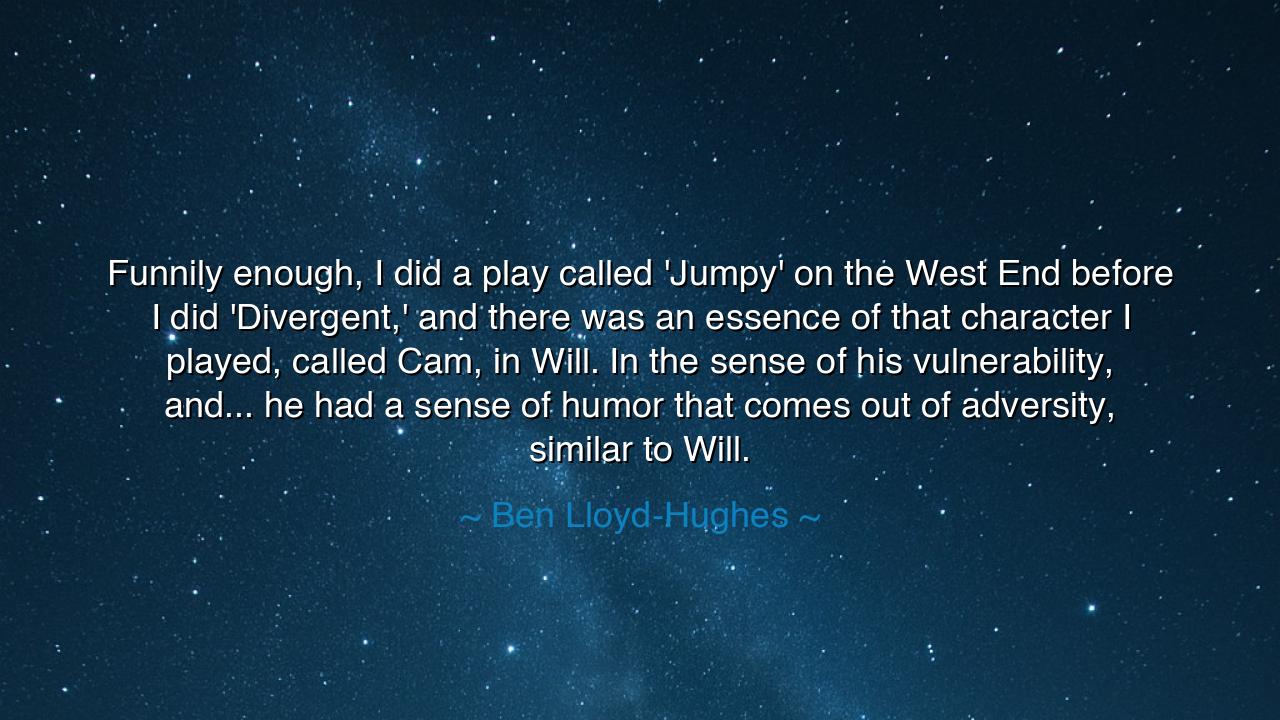
Funnily enough, I did a play called 'Jumpy' on the West End
Funnily enough, I did a play called 'Jumpy' on the West End before I did 'Divergent,' and there was an essence of that character I played, called Cam, in Will. In the sense of his vulnerability, and... he had a sense of humor that comes out of adversity, similar to Will.






In this reflection by Ben Lloyd-Hughes, there lies a quiet truth about the human spirit — that humor born of adversity is among the noblest forms of strength. When he speaks of his roles in “Jumpy” and “Divergent,” he is not merely recalling his work as an actor, but unveiling the shared soul between two characters: vulnerability wrapped in courage, sorrow wrapped in laughter. He speaks of Cam and Will, but beneath their names beats the same heart that beats in all who have suffered and yet smiled — the heart that finds light in darkness, and grace in pain.
In the ancient days, philosophers would say that the gods test men not by giving them battles they cannot win, but by seeing whether they can still laugh when the storm breaks. To possess a sense of humor that comes out of adversity is not to deny suffering — it is to master it. It is to say, “Though I bleed, I shall still sing.” It is this laughter, not born of ignorance, but of wisdom — the laughter that knows how small pain is in the vastness of time, and how enduring the soul becomes when it refuses to be crushed.
Consider the tale of Viktor Frankl, a man imprisoned in the horrors of the concentration camps during the Second World War. Stripped of everything, he found that the one thing that could not be taken from him was his attitude toward suffering. In his memoir, he recalled moments when he and fellow prisoners would make small jokes — dark, brief sparks of humor amidst the abyss. That humor did not lessen their torment, but it affirmed their humanity. It was, as Lloyd-Hughes suggests, humor born of adversity — a refusal to let despair claim the soul.
There is something divine in such resilience. Vulnerability is not weakness — it is the raw material of transformation. Both Cam and Will, in their own fictional worlds, show that when a man dares to be open, to love, to hope, to laugh even when broken, he becomes unshakable. His laughter is not light — it is forged in fire. His humor becomes the song of the survivor, the melody of one who has seen both shadow and dawn and understands the worth of both.
In every age, such spirits have walked among us. The wandering poets, the weary soldiers, the mothers who bury children yet still whisper lullabies to the night — all carry within them this humor of endurance. It is the echo of an ancient truth: that laughter is not merely joy, but rebellion. When one can laugh in sorrow, one declares to the world — “You may wound me, but you cannot own me.”
So, when Ben Lloyd-Hughes found in his characters the same thread of humor rising from pain, he was witnessing something timeless — the echo of life itself. Every actor who touches the depths of emotion learns this truth: the greatest art is born from suffering transcended, not escaped. Through such art, we are reminded that the human heart is infinite in its ability to rise again and again, clothed in light though it has walked through darkness.
The lesson, then, is clear and eternal: when hardship visits, do not let bitterness be your companion. Instead, find that quiet, brave humor that says, “Even this shall pass, and I shall smile again.” To those who suffer now, take this as your guide — learn to laugh, not in mockery of pain, but in mastery of it. For he who can find humor in adversity has discovered not only survival, but freedom — the freedom of an unconquered soul.






AAdministratorAdministrator
Welcome, honored guests. Please leave a comment, we will respond soon